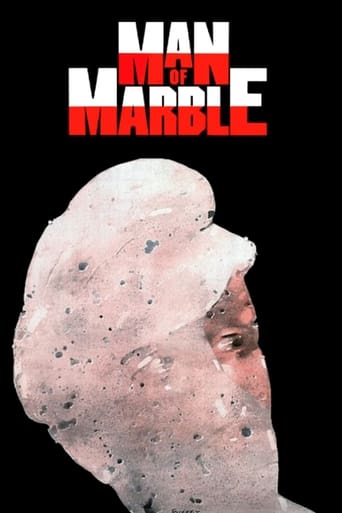

Brilliant and touching
... View MoreSimple and well acted, it has tension enough to knot the stomach.
... View MoreThe performances transcend the film's tropes, grounding it in characters that feel more complete than this subgenre often produces.
... View Morea film so unique, intoxicating and bizarre that it not only demands another viewing, but is also forgivable as a satirical comedy where the jokes eventually take the back seat.
... View MoreI found this Polish film in the book 1001 Movies You Must See Before You Die, alongside its followup Man of Iron which came five years later, and which I almost watched first, this original definitely sounded interesting, from director Andrzej Wajda (Ashes and Diamonds). Basically young filmmaker Agnieszka (Krystyna Janda) is making her diploma film, she decides to focus it on the 1950s, the Stakhanovite movement, and the man who became a symbol of an over-achieving worker, in Nowa Huta, heroic Polish bricklayer Mateusz Birkut (Jerzy Radziwiłowicz). From stock footage, including outtakes and censored footage, in the archives, interviews with some people who knew the propagandist, including his ex-wife, his friends the filmmaker who helped him become a hero to the people, and the marble statue of the man found beneath ground, she chronicles Birkut's life. We see the life of Birkut in flashbacks, including his early beginnings, his fall from grace, and his rise to become a hero during the workers' revolution to the people with his multiple brick laying in building housing, but no-one knows what has happened to him. But Agnieszka's hard-driving style and content for her film are causing concern for the authorities and unnerving her supervisor, they think the student is digging in too deep to recent history, the supervisor kills the project, claiming it is over budget her footage and equipment are confiscated. Agnieszka's father suggests there is a single specific reason the authorities do not want the film to be completed and released, so following her seeing more footage found and the advice, she takes some equipment and goes to find Birkut for herself and ask him questions, even if she is not involved in the making of the film, in the end she does find Birkut's son Maciej Tomczyk (also Radziwilowicz) in the Gdańsk Shipyard, he tells her that his father died years ago. Also starring Tadeusz Lomnicki as Jerzy Burski, Jacek Lomnicki as Young Burski and Michal Tarkowski as Wincenty Witek. I am not sure I know fully why this film was withheld for four years, but it works as both a pseudo-documentary and a thriller of sorts, with a filmmaker going into places she shouldn't go, and seeing the origins of the man she is trying to find out about, I admit there were some slow spots, but all together it is an interesting drama. Very good!
... View MoreI came to this film after having watched Wajda's "Ashes and Diamonds," which I consider to be one of the finest films I have seen. However, "Man of Marble" was just too quirky for me, leaving me a bit perplexed. The story concerns a young film student, known here only as Agnieszka, who decides to produce a documentary on one Mateusz Birkut as her graduation project. Birkut was an idealistic bricklayer who rose to the status of post-WWII hero by way of displaying superior efficiency and strength. His innovation of how to use a small team to accomplish improved production came to be so well recognized that he would tour the country setting up such teams. The film time-slices from the 1970s, when Agnieszka is making her film, to previous times, all the way back to mock documentary footage of Birkut in the 1950s. The presentation is anything but flattering to the Communist Party and it is astounding the Wajda was able to get this made in a time when the Communists were still in power in Poland. The story must be autobiographical to some extent, since we see Agnieszka encountering political opposition to her digging too deeply into the past trying to reconstruct Birkut's life and figure out why he essentially dropped from the scene after having been so highly visible; there is also a famous film director in the movie whom we get to know well.There are many scenes that had the quality of a dream, but yet seemed like they were supposed to be taken for real. For example, one scene has Burkit's friend Witek going into a small office of a party boss and, when Burkit enters the office some time later there is no sign of Witek. If this were to be taken as some sort of Kafkaesque event, then Burkit would have made no remark on the mysterious disappearance, but he express the surprise that any normal person would have. I did not know what to make of such scenes. Agnieszka's facial expressions and body movements are often quite odd, bordering on the bizarre, and they accentuated the feeling of unreality I had that became increasingly more pronounced as the movie progressed.The collage of Agnieszka's interviews, mock documentary footage, scenes from Burkit's life, scenes from Agnieszka's own life, and an inappropriate musical score did not coalesce for me.
... View MoreAndrzej Wajda has always impressed me, and his war trilogy are among the best and most essential films in the history of cinema, but "Man of Marble" is an ambitious, interesting idea that isn't realized very well in script or in terms of the finished product.The most interesting aspect of "Man of Marble" outside of the much-examined similarities to "Citizen Kane" is how subversive it is. I wonder how this was ever released in Poland at the time, and the scenes in the film where I felt Wajda really did succeed as a director is where he contrasts Soviet propaganda with the actual events- very powerful. Wajda fails more than he succeeds with this particular film though, it's a disjointed narrative and it takes tremendous skill to keep the audience interested in both stories. Sure, one may argue that "Man of Marble" isn't intended as entertainment, but even in the context of art-house cinema this film is only engaging in parts, with Agnieszka's attempt to make this film ending up far more interesting than the film she's making.I can see where Wajda is going with the way he shot this film, but it just doesn't work very well, and the score for this film has to be one of the worst matches I've ever come across. It's ludicrous.Something of a companion piece by the same writer and director, I found "Man of Iron" far more engaging and impressive.5/10
... View MoreWajda's MAN OF MARBLE is one of the most compelling attacks on government corruption that I have ever seen. It is a "Citizen Kane"-styled story of a female film student who tries to trace the history of Birkut, a long-forgotten "hero" of the Polish Communist government.She begins by viewing propaganda film that praises Birkut as a devout worker who slaves away at brick-laying for the officials. He has the appearance of a vigilant, Hercules-like strongman who breezes through the labor without breaking a sweat. Then she goes to interview the director, who was hired by the government. He tells her about the reality of making the film, such as how Birkut was given extra food and water (unlike the other bricklayers). Wajda uses these two conflicting scenes to deconstruct the false imagery that propaganda gives its viewers. He shows us how officials manipulate such situations to their own political good.The student goes on to interview other subjects who describe the brutal reality of Birkut's off-camera existence. In one devastating scene, she meets his wife, who breaks down and tries to avoid being interviewed. As the truth becomes clearer and clearer, the government begins to intercede in the production of the student's film.Wajda was a film-maker who was not afraid to criticize the harsh Polish government that eventually was defeated by individuals such as Lech Walesa. MAN OF MARBLE is a testament to those who had to live through the oppression of Communism, and also to those who are still living under its iron fist.
... View More